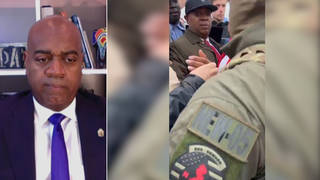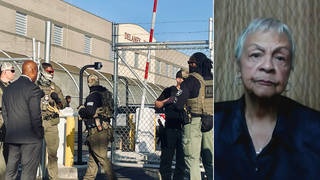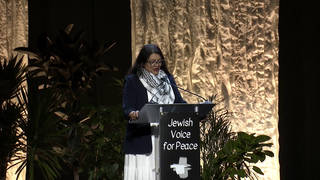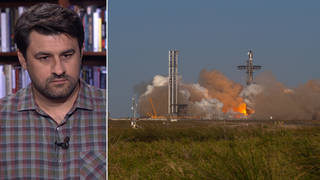
Guests
- Nadje Al-Alidirector of the Center for Middle East Studies at Brown University, where she’s a professor of anthropology and Middle East Studies.
As the 20th anniversary of the U.S. invasion of Iraq approaches next week, Democracy Now! begins our look at the Iraq War’s lasting after-effects on Iraqi society and the shape of global politics today. “The story of the past 20 years is a story of destruction, devastation, corruption, incompetence, but also a story of resilience,” says Nadje Al-Ali, director of the Center for Middle East Studies at Brown University and author of several award-winning books on the U.S. invasion and occupation of Iraq, including What Kind of Liberation? Women and the Occupation of Iraq.
Transcript
AMY GOODMAN: This is Democracy Now!, democracynow.org, The War and Peace Report. I’m Amy Goodman, with Nermeen Shaikh.
Twenty years ago today, peace protests rocked the globe, held across the world, urging the United States to halt its imminent plans to invade Iraq. There were over 6,000 candlelight vigils held March 16, 2003, as part of a day of action called by the late Archbishop Desmond Tutu of South Africa and others.
Three days later, U.S. President George W. Bush announced the invasion of Iraq had begun. He spoke on the night of March 19th, 2003, in Washington, D.C.; it was already March 20th in Iraq.
PRESIDENT GEORGE W. BUSH: My fellow citizens, at this hour, American and coalition forces are in the early stages of military operations to disarm Iraq, to free its people and to defend the world from grave danger. On my orders, coalition forces have begun striking selected targets of military importance to undermine Saddam Hussein’s ability to wage war. These are opening stages of what will be a broad and concerted campaign.
AMY GOODMAN: President Bush justified the invasion on the false claim that Iraq’s formerly U.S.-backed dictator Saddam Hussein was secretly amassing WMDs, weapons of mass destruction. Over the coming days on Democracy Now!, we’ll look back at how the U.S. invasion devastated Iraq, caused upheaval around the globe.
Today we’re joined by Nadje Al-Ali. She’s the director of the Center for Middle East Studies at Brown University, where she’s a professor of anthropology and Middle East studies. She’s also the author of several award-winning books on the U.S. invasion and occupation of Iraq, including What Kind of Liberation? Women and the Occupation of Iraq.
Professor Al-Ali, welcome to Democracy Now!, Professor Al-Ali.
NADJE AL-ALI: Yeah, thank you.
AMY GOODMAN: You’re joining us from Providence, where you’re a professor at Brown. You’ve been looking at this and your own history for years. Talk about what we should understand 20 years after the U.S. invaded Iraq.
NADJE AL-ALI: Well, the invasion had a devastating impact on Iraqi society. I, myself, have been trying to document the gap between the rhetoric of liberation and bringing human rights, democracy, and particularly in relation to women’s rights, to Iraq and the reality of what happened in the aftermath, with putting it against the historical background of 13 years of the most comprehensive sanctions that a country ever experienced. I think that’s really important, that when we think about the devastation and destruction of Iraqi society, it actually doesn’t start in 2003. It started with the sanctions regime on the 2nd of August, 1990.
But, yeah, to my mind, really, the biggest losers in the post-invasion scenario have been women — I mean, the very same people that actually President Bush used them as a symbol of the midwives of the new Iraq, as he used to say. And while it is true that women have — initially, in the aftermath, there was some hope. There was quite a bit of mobilization, a mushrooming of women’s rights organizations. What we have seen systematically since 2003 is an erosion of the kinds of rights and the access to resources, to healthcare, to education, to labor force, that women actually had during the Baath regime. And I’m in no business of justifying the atrocities that Saddam Hussein committed during the 35 years of Baath, but the fact is that the 2003 invasion led to greater gender-based inequality, towards a shift towards greater social conservatism. It led to lawlessness, chaos, a destroyed infrastructure. Healthcare is in shambles. Education is struggling. And so, everyday life has become really, really hard, not only for the thousands and thousands of Iraqis who have been displaced internally or have become refugees in neighboring countries or come to Europe or to the U.S., but, you know, people who stayed behind.
And so, for me, the story of the past 20 years is a story of destruction, devastation, corruption, incompetence, but also a story of resilience. I mean, you know, Iraqis are not just passive victims. And when I think about the 20 years, I’m not just thinking about the U.S. and the U.K. and their responsibility; I am also thinking about corrupt Iraqi politicians, sectarian militia leaders and criminal gangs who have been terrorizing the country. And while they have been facilitated by the invasion, they also have to take responsibility. So it’s a very complex picture. But I think, you know, one of the things that we have seen is that there is a new generation of Iraqis who’s really trying to turn things around. We have seen large-scale protest movements over the past few years. So there is some hope. But it’s — what we’ve seen, really, is a tragedy that has been unfolding and that was definitely not necessary. And although I don’t think that there is a “good invasion,” I think that in addition to the invasion, the U.S. did everything wrong that it could have done in the aftermath of the invasion.
NERMEEN SHAIKH: So, Professor Al-Ali, could you elaborate on that? What did the U.S. do after the invasion that was wrong?
NADJE AL-ALI: Well, I mean, most notably, the disbanding of the military, and all of a sudden we have a million-plus young men on the street without jobs, with arms. That contributed to the creation of militia and, you know, lots of grievances within this element of population.
The other thing is to go into Iraq and think of it in sectarian terms. So, the Coalition Provisional Authority that was established by the U.S. was all based on so many Sunnis, so many Shias, so many Christians, so many Kurds, instead of thinking about the country in terms of political terms. So that actually reified and contributed to the sectarian divisions in Iraq.
Aside from the fact that women’s rights were the first — the first things that dropped off the agenda. I mean, you have — in the aftermath of the invasion, when there was an explosion of lawlessness and chaos and gender-based violence, you have had U.S. military personnel who were approached by Iraqi women’s rights activists and who were told, “Well, we don’t do women.” So, you know, despite all this rhetoric of, “Yes, we are contributing to the liberation of women,” the opposite took place. The U.S. administration, military and also the Coalition Provisional Authorities turned a blind eye when we saw the mushrooming of gender-based violence.
And then, also de-Baathification, although, of course, it was very important, the process of coming to terms with the past 35 years of a brutal dictatorship, but the way that de-Baathification actually ended up working was that it really alienated a large percentage of the population, and it contributed again to the sectarian divisions. And we know, of course, that ISIS is one side effect of the invasion and the occupation.
NERMEEN SHAIKH: Professor Al-Ali, you mentioned, I mean, to look at the context in which this invasion took place. It came after 11 years of these brutal sanctions against Iraq — more than 11 years, I think it was 13 years.
NADJE AL-ALI: Thirteen. Thirteen years, yes.
NERMEEN SHAIKH: Thirteen years, yes, sorry. Thirteen years of sanctions, and just prior to that, Iraq having emerged from an eight-year war with Iran.
NADJE AL-ALI: Correct.
NERMEEN SHAIKH: So, if you could —
NADJE AL-ALI: Yes.
NERMEEN SHAIKH: — talk about both those things?
NADJE AL-ALI: Yes, yes. Yeah, no, I think, you know, we really need to think more carefully about the 35 years, because in the ’70s, actually, Iraq was, despite being a dictatorship, it was flourishing economically. You know, there was the push for women to enter the labor force, education. There was a welfare state.
Things started to get worse during the '80s, as you mentioned, from 1980 to ’88, the war with Iran. During this period, everyone between — every man between the ages of 15 and 65 had to go to the front. Women during this period became “superwomen,” because Saddam Hussein at some point came out, in ’85 or — '85, and said, “Every good Iraqi woman should have five children.” At the same time, while women were under pressure to produce the future soldiers of Iraq, they were — you would find them in all kinds of jobs. And when I was visiting Iraq during that time, I saw women working at petrol stations, driving trucks. And so, you know, women filled up many of the jobs that were previously held by men. So, not a good situation, but a situation where women did play an active role.
And then, from — following the invasion of Kuwait in August 1990, we had the onset of sanctions. And although the idea was the justification was to contain Saddam, it actually had the opposite effect. Saddam controlled the limited resources. It’s during this time that we saw this incredible shift in terms of increased poverty. We saw the feminization of poverty. We saw that all the welfare services that the state provided, like free child care, free transportation to work, a robust healthcare system, a robust education system, all this eroded during this period. And I remember my aunt telling me during this time, she said, you know, the first Gulf War, 1991, following the invasion of Kuwait, bridges were destroyed, but sanctions destroyed our society. And, you know, you cannot recover from that.
AMY GOODMAN: Professor Al-Ali, if you could end —
NADJE AL-ALI: Or you can’t recover quickly.
AMY GOODMAN: — we just have a minute — with your —
NADJE AL-ALI: Yes.
AMY GOODMAN: — what you want to leave people with on this 20th anniversary of the war?
NADJE AL-ALI: Well, I think that for people in the U.S., this is high time to rethink U.S. military interventions in the world, but it’s also time to think about responsibility, accountability and possible reparations. But I also want to end on a note that, as I said, the young generation of Iraqis are trying to go beyond, live beyond the impact of the invasion and occupation. There is lots of creativity and resourcefulness and positive energy. So I have some hope. But I think for people especially in this country, you know, it’s high time to really rethink U.S. military involvement and also policy more broadly, not just in Iraq but in the Middle East and the world generally.
AMY GOODMAN: Nadje Al-Ali is director of the Center for Middle East Studies at Brown University, where she’s a professor of anthropology and Middle East studies. Her books include What Kind of Liberation? Women and the Occupation of Iraq. In fact, there are still 2,500 U.S. troops in Iraq.
Democracy Now! is currently accepting applications for a digital fellow. Learn more and apply at democracynow.org.
Democracy Now! produced with Mike Burke, Renée Feltz, Deena Guzder, Messiah Rhodes, María Taracena, Tami Woronoff, Charina Nadura, Sam Alcoff, Tey-Marie Astudillo, John Hamilton, Robby Karran, Hany Massoud. I’m Amy Goodman, with Nermeen Shaikh.













Media Options